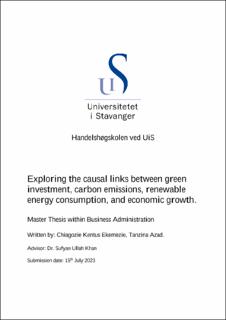| dc.description.abstract | The global economy is affected by ecological imbalance and climate challenges. Non-renewable energy consumption and carbon emissions are crucial reasons behind environmental degradation. Global awareness regarding climate change and environmental degradation is currently at its highest point. This thesis aims to explore and recognize the causal links between green investment, carbon emissions, renewable energy consumption, and economic growth of ten European Union countries from 2010 to 2019.
Through a comprehensive literature review on the same line of scholarly research, we gained valuable and in-depth insight into the previously explored relationships between the concepts of our study. Further, in a theoretical framework, we have evaluated and discussed the relevant theories, such as the Environmental Kuznets curve, Harrod Domar growth model, and the Environmental growth hypothesis, which are applied to determine the causal links that exist between the selected variables of our thesis.
For the empirical analysis, we have extracted secondary data from the World Bank’s World Development Indicator’s online database and Eurostat. The empirical results and discussion part started with descriptive statistics, correlation analysis, and unit root tests to understand the essential characteristics of the variables. Further, we adopted the linear and quadratic regressions, the vector autoregressive model (VAR), and the Granger causality test to determine the statistical significance and direction of the causal relationship between the key variables of our thesis.
Our research findings show positive and negative correlations among all the variables, but all the coefficients are not statistically significant among all the models. The quadratic regression and VAR model show that renewable energy consumption has a negative relationship with carbon emissions and a positive impact on economic growth. Furthermore, green investment and carbon emissions showed a statistically significant relation with economic growth. The Granger causality test found that renewable energy has a bidirectional causality with carbon emissions and green investment. Economic growth also has a bidirectional causality
with carbon emissions. However, the nexus between green investment and carbon emissions is unidirectional.
According to the analysis results, we recommend adopting policies that promote green investments and encourage renewable energy consumption to reduce carbon emissions, ultimately achieving sustainable economic growth. | |
